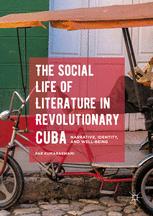

Most ebook files are in PDF format, so you can easily read them using various software such as Foxit Reader or directly on the Google Chrome browser.
Some ebook files are released by publishers in other formats such as .awz, .mobi, .epub, .fb2, etc. You may need to install specific software to read these formats on mobile/PC, such as Calibre.
Please read the tutorial at this link: https://ebookbell.com/faq
We offer FREE conversion to the popular formats you request; however, this may take some time. Therefore, right after payment, please email us, and we will try to provide the service as quickly as possible.
For some exceptional file formats or broken links (if any), please refrain from opening any disputes. Instead, email us first, and we will try to assist within a maximum of 6 hours.
EbookBell Team

4.0
26 reviewsThis study explores the social functions of literature from the perspective of policymakers, writers, readers and residents in contemporary Cuba. It provides a new perspective on post-59 Cuban literature that underlines how cultural policy has made literature a hybrid activity between elite and mass culture, with inherent social, rather than aesthetic or political, value. Whilst many traditional studies of Cuban literature assume either its subjugation to politics and ideology or, conversely, its role in resisting political discourse via a rather naïve notion of artistic freedom, this project explores the varied, dynamic and multiple ways in which literature works in Cuban society: as a catalyst for identity construction aimed at consensus and belonging, but also as an instrument of self-differentiation and self-definition, even in the more recent context of a more market-oriented system. The study reviews policy from 1959 to the present, and presents contemporary case studies exploring the social functions of literature for writers, readers and ordinary Havana residents.